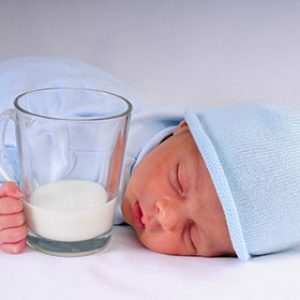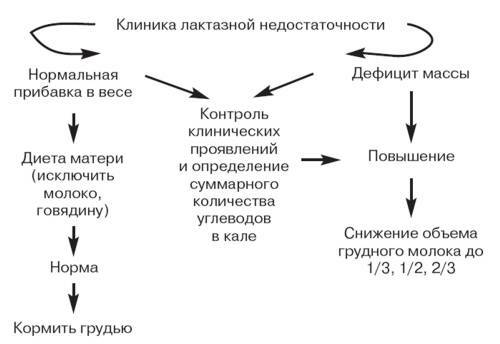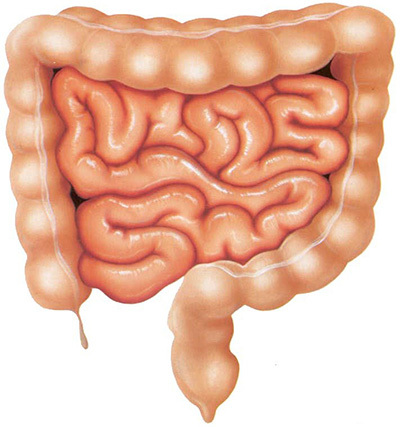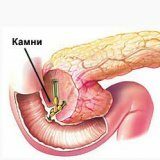Lactase insufficiency in infants and adults

Lactase deficiency is a syndrome that occurs due to a violation of lactose digestion, characterized by watery diarrhea.This pathology can occur only if the human intestine lacks the enzyme lactase, which digests milk sugar( lactose).
Table of contents: Types of lactase deficiency Causes of lactase deficiency Symptoms of lactase deficiency Diagnosis of lactase deficiency Treatment of lactase deficiency Let's sum upThere are several signs of the pathology in question that should alert the mother:
- foamy, loose stool;
- feces have an acidic odor;
- is present with bloating.
Children often suffer from lactase deficiency, and this disease is the main reason for not breastfeeding.Modern medicine has a slightly different view on the assertion that lactase deficiency can be present even during breastfeeding of an infant, therefore all the available information will be considered in the presented material.
Types of lactase deficiency
In medicine, there are two main types of the disease under consideration:
- Primary lactase insufficiency.This species encompasses three forms of pathology:
- congenital lactase deficiency - is extremely rare, its occurrence is associated with genetic mutations;
- transient lactase deficiency - occurs in preterm infants who were born on the 34-36th week of pregnancy, due to low enzyme activity;
- Lactase deficiency in adults - not recognized as pathology, is considered an "indicator" of the natural process of decreasing lactase activity with age.
- Secondary lactase deficiency.In this case, it will be a pathology, which is directly related to damage to intestinal cells.
Many simply do not understand the danger of lack of lactase, but doctors clearly distinguish the consequences of such a pathology:
- dehydration( more common in infants);
- Calcium and other minerals are absorbed by the body very poorly;
- a useful microflora in the intestine practically ceases to grow;
- actively starts to reproduce putrefactive microflora;
- intestinal peristalsis is not working properly;
- suffers from the human immune system.
Causes of lactase deficiency
Primary lactase insufficiency may occur for the following reasons:
- A mutation in a gene that must control lactase activity - this causes the congenital appearance of the disease in question.
- Insufficient activity of the enzyme at the time of the birth of the child - it is a question of preterm infants, after a certain time the enzyme starts to work in normal mode, and the lactase deficiency simply disappears.
- Various diseases of the intestine( inflammatory, infectious and dystrophic) - this will cause the development of the pathology in adults.Lactase deficiency can also develop due to age-related changes in the body, when the activity of the enzyme decreases naturally.
Secondary lactase insufficiency may develop on the background of inflammatory and / or degenerative processes in the intestines that occur against the background of infectious diseases, food allergies, gluten intolerance, radiation injury, Crohn's disease or drug exposure.Also, secondary lactase deficiency is often diagnosed in those patients who underwent surgery for the removal of the part of the intestine, or in a history of having a syndrome of the small intestine.
Note: activity of lactase may vary.In addition to the main factors, the activity of the enzyme is affected by the hormones of the thyroid gland, and fatty acids, and the pituitary hormones, and amino acids, and pancreatic hormones, and nucleotides.
Symptoms of lactase deficiency
Typically, the signs of the development of primary and secondary lactase deficiency are similar:
- diarrhea, which is characterized by a watery, foamy feces with a green tinge and an acidic odor;
- bloating and lack of appetite;
- vomiting, pain and rumbling in the abdomen;
- in infants: frequent regurgitation, intestinal colic, low weight gain, anxiety.
 Congenital lactase deficiency is considered a rare and severe type of pathology.In principle, the mother can understand that the baby has a deficiency of lactase from the first days of his life - feeding with breast milk leads to vomiting and non-stop diarrhea.It helps to cope with this condition only the refusal of breastfeeding and switching to food with special lactose-free mixtures.
Congenital lactase deficiency is considered a rare and severe type of pathology.In principle, the mother can understand that the baby has a deficiency of lactase from the first days of his life - feeding with breast milk leads to vomiting and non-stop diarrhea.It helps to cope with this condition only the refusal of breastfeeding and switching to food with special lactose-free mixtures.
Important! Here the parents of babies should stop and do not run urgently on doctors and shops, and finish reading the material until the end - many doctors quickly refute the fears of many mothers that it is her child who has this most lactose deficiency!
Primary lactase deficiency occurs only after consuming large amounts of milk.For the early childhood will be characterized by intestinal colic, but with the growth of the baby, the intestinal microflora adapts to milk sugar and the symptoms of lactase deficiency no longer appear.At an older age a person may have a stomach ache and diarrhea begin when whole milk is consumed, but never this happens when introducing sour-milk products into the menu.
Secondary lactase deficiency can appear at absolutely any age against a background of any disease.Specific symptoms of the pathology under consideration will be very difficult, because the clinical picture will correspond to the underlying disease.But if a person adheres to a dairy-free diet, his condition will improve noticeably.
Diagnosis of lactase deficiency
In order for a doctor to confirm a diagnosis, a complete examination will be necessary, and, for the most part, it is carried out by laboratory tests. As part of the diagnostic measures for lactase deficiency, the following is done:
-
 Load test with lactose.Thus, the increase in sugar in the blood, determining the curve.If there is an enzyme deficiency in the human body, then the graph will have a flattened curve type, which means that there is no normal increase due to poor absorption of sugar.
Load test with lactose.Thus, the increase in sugar in the blood, determining the curve.If there is an enzyme deficiency in the human body, then the graph will have a flattened curve type, which means that there is no normal increase due to poor absorption of sugar. - Stool analysis.It is necessary to determine the amount of carbohydrates in it.Normally, this indicator should be absent altogether, but babies are allowed the presence of carbohydrates in the stool at 0, 25%.
- Hydrogen respiratory test.Every 30 minutes an exhaled air sample is taken to determine the concentration of hydrogen.Such an analysis is carried out for three hours after loading with lactose.
In addition, doctors can prescribe a genetic test and identify a gene mutation, or a diagnostic diet with the exception of milk sugar - with lactase deficiency such a measure will significantly improve the bowel condition, the symptoms of pathology will disappear.The most informative diagnostic method in this case is the determination of the activity of the enzyme, which is carried out by examining the biopsy or flushing from the intestinal mucosa.But such research is extremely rare, as there are difficulties in the collection of material.
Treatment of lactase deficiency
Treatment of the disease under consideration will necessarily be comprehensive. It includes three stages:
- medical nutrition and food supplement intake;
- help the pancreas - the patient is prescribed enzymes pancreatin, festal, creon and others;
- correction of intestinal dysbacteriosis - prebiotics and probiotics, hilak forte and others.
Since lactase deficiency always has pronounced symptoms, symptomatic therapy may also be prescribed.For example, with intensive intestinal colic, children are prescribed Espumizan or Bobotik, and from pain in the intestines adults can take No-shpa or Drotaverina hydrochloride.
Therapeutic nourishment for lactase deficiency
Diet for the disease in question implies a partial or complete exclusion of lactose.As a rule, complete exclusion of lactose is a temporary measure and it is advisable to administer it only if the child's condition is severe.

Note: is completely unavoidable because it is a natural prebiotic.The main task of therapeutic nutrition for lactase deficiency consists in individual selection of a diet with an amount of lactose that does not cause digestion and does not provoke the release of carbohydrates along with feces.
For children with artificial or mixed feeding, the physician should choose the optimal combination of a lactose-free and normal mixture, but if the lactase deficiency is pronounced intensively, the child is completely transferred to lactose-free formula for feeding.
It is very important for lactase deficiency to correctly introduce lactation to the baby, because some products can cause the reaction of the intestine is absolutely the same as for lactose.Start feeding will need to be with vegetable mashed potatoes, moreover, getting used to one vegetable should last at least two weeks.By 6 months, the baby can be offered porridges on water with a low content of gluten( for example, corn, rice or buckwheat).Only after the organism of the crumbs fully adapts to these products, you can offer him kefir or natural yogurt.
Note: parents should closely monitor the reaction of the baby's body to the introduction of each new product.Start lure is necessary with small doses, gradually increasing them.
Further nutrition of the child and adolescent should be balanced and safe.Of course, you need to monitor the health of a person with lactase deficiency and when you enter a new product, and even with a normal diet.Somewhere up to 7-10 years in the baby's menu there should be lactose-free products - for example, pasta, fruit, meat, buckwheat, fish, corn and others.But at an older age, you can enter into the menu and products with lactose - for example, cottage cheese, sour cream, cheese, biscuits, cocoa, mayonnaise and others. Signs that the product can be consumed will be:
- no increased gas generation;
- normal stool;
- absence of rumbling and abdominal pain.
Diet for lactase deficiency alleviates the condition of patients, but at the same time deprives them of the main source of calcium.Therefore, the question of replenishment of the quantity of this valuable trace element in the body must be solved with the attending physician.
Summing up
So, lactase deficiency in infants can be with artificial feeding, and with natural.But many doctors say that breastfeeding of the pathology in question simply can not be!And even greenish, frothy feces, intestinal colic and frequent regurgitation are not symptoms of lactase deficiency.Indeed, even "classical" medicine suggests that the symptoms of the disease in question are nonspecific and may indicate a number of other abnormalities in health.
What parents need to know:
- Intestinal colic occurs in almost every newborn, and they do not mean lactase deficiency.Only on this basis, no diagnoses can be made.
- Frequent regurgitation can occur due to improper feeding( baby swallows air with milk).
- Frothy and greenish stools - this, of course, is not the norm, but so can the adaptation of the intestine to the "adult" life.
- Anal feces for carbohydrates and respiration for hydrogen often give false positive results, so these tests are highly questioned in the diagnosis of lactase deficiency.
- Incomplete digestion of lactose in the first week of life of the baby often refers to normal phenomena and occurs even in absolutely healthy children.Sometimes this period of adaptation stretches to five months of age of the child and this is also considered the norm.
 So, let's draw a conclusion: if a newborn child does not refuse food, does not show concern, develops within the limits of the norm and gains weight either "on the table" or with a slight lag, then wean it and run around in searchLactose-free mixtures are not necessary!
So, let's draw a conclusion: if a newborn child does not refuse food, does not show concern, develops within the limits of the norm and gains weight either "on the table" or with a slight lag, then wean it and run around in searchLactose-free mixtures are not necessary!
And one more thing: if the doctor diagnoses "lactase deficiency", or the parents themselves( oh, horror!) Determine this pathology in their own baby, then they go for a lactose-free mixture in specialized stores.The cost of such nutrition is high enough, so some doctors suspect that the frequent diagnosis of "lactase deficiency" is just a marketing move.
Lactase deficiency does exist.Yes, in some cases, the child's condition requires a change in diet, refusal from breastfeeding and switching to special mixtures.But such measures are considered the most extreme, and in most cases the child should just give time to adapt to the new conditions of life.So, parents should be competent and prudent, carefully monitor the condition of their baby and in no case should they make their own diagnoses and certainly not use any special mixtures for feeding.
Tsygankova Yana Aleksandrovna, medical reviewer, therapist of the highest qualification category



